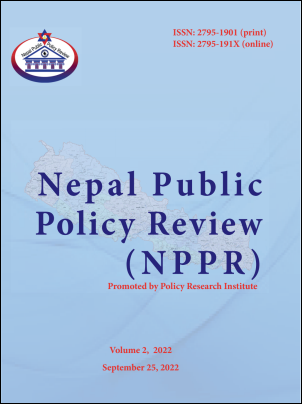Gendered Impact of Financial Inclusion on Climate Change Adaptation among Rural Rice Farmers in Nepal
Keywords:
Climate Change, Adaptation, Financial Inclusion, Female Rural Rice Farmers, Binary Logistic RegressionAbstract
The present paper examines the gendered impact of financial inclusion on climate change adaptation among rural rice farmers across seven Nepalese districts through an odds-ratio-based binary logistic regression analysis. Primarily the study indicates that the availability of loans makes female farmers 7.6 times (significant) more likely to adopt climate change adaptation, whereas, in the case of male farmers, access to loans does not have a significant impact; and access to phone plays a significant role (odd ratio of 1.9) in encouraging female farmers to undertake climate change adaptation. Thus, from a policy perspective, there is need to increase loan availability to rural Nepalese female rice farmers to facilitate climate change adaptation. Specific schemes targeting this section need to be formulated and implemented. Moreover, mobile phone-based innovative applications could be used as a potent tool by banks for achieving financial inclusion along with significant associated positive externalities for the environment.
Downloads
Downloads
Published
How to Cite
Issue
Section
License
Copyright (c) 2022 Sanchita Joshi, Nirandjan Devkota, Vaibhav Puri

This work is licensed under a Creative Commons Attribution-NonCommercial 4.0 International License.




